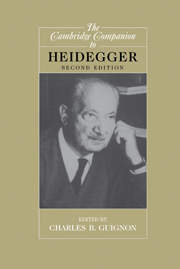Book contents
- Frontmatter
- Introduction
- 1 The question of being: Heidegger’s project
- 2 Reading a life: Heidegger and hard times
- 3 The principle of phenomenology
- 4 Time and phenomenology in Husserl and Heidegger
- 5 Laying the ground for metaphysics: Heidegger’s appropriation of Kant
- 6 Heidegger and the hermeneutic turn
- 7 Engaged agency and background in Heidegger
- 8 Death, time, history: Division II of Being and Time
- 9 Truth and the essence of truth in Heidegger’s thought
- 10 Authenticity, moral values, and psychotherapy
- 11 Heidegger, Buddhism, and deep ecology
- 12 Heidegger and theology
- 13 Heidegger on the connection between nihilism, art, technology, and politics
- 14 The fourfold
- Bibliography
- Index
- Series List
3 - The principle of phenomenology
Published online by Cambridge University Press: 28 March 2007
- Frontmatter
- Introduction
- 1 The question of being: Heidegger’s project
- 2 Reading a life: Heidegger and hard times
- 3 The principle of phenomenology
- 4 Time and phenomenology in Husserl and Heidegger
- 5 Laying the ground for metaphysics: Heidegger’s appropriation of Kant
- 6 Heidegger and the hermeneutic turn
- 7 Engaged agency and background in Heidegger
- 8 Death, time, history: Division II of Being and Time
- 9 Truth and the essence of truth in Heidegger’s thought
- 10 Authenticity, moral values, and psychotherapy
- 11 Heidegger, Buddhism, and deep ecology
- 12 Heidegger and theology
- 13 Heidegger on the connection between nihilism, art, technology, and politics
- 14 The fourfold
- Bibliography
- Index
- Series List
Summary
Heidegger was remarkable not just for his philosophical originality, but also for the breadth and depth of his response to the tradition. He learned an enormous amount from, and engaged in provocative ways with, figures spanning the entire history of ancient, medieval, and modern philosophy from the Presocratics to Nietzsche. And yet, perhaps inevitably, to other important thinkers he remained either indifferent or hostile - for example, Spinoza, Rousseau, Fichte, Schopenhauer, Marx, Freud, Frege, Wittgenstein, Carnap, not to mention practically the entire Anglo-American tradition from Hobbes to Dewey.
In which of the two groups would the founder of phenomenology, Edmund Husserl, have found himself, had he not accepted the appointment as chair at the University of Freiburg in 1916 and become a kind of professional mentor to his younger colleague? Heidegger assumed the Freiburg chair himself upon Husserl's retirement in 1928; indeed, the association of their names had already become a fact of history even before the publication of Being and Time in Husserl's Jahrbuch, complete with its dedication to him “in admiration and friendship.”
- Type
- Chapter
- Information
- The Cambridge Companion to Heidegger , pp. 97 - 119Publisher: Cambridge University PressPrint publication year: 2006
- 8
- Cited by



